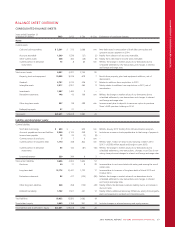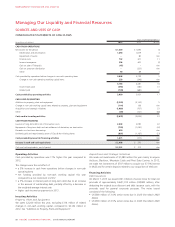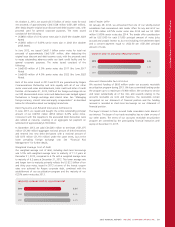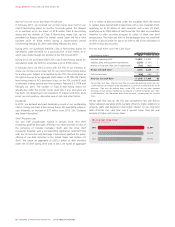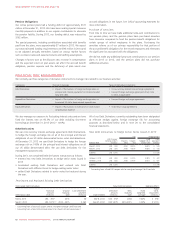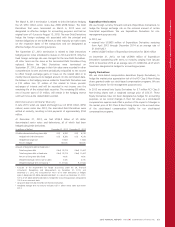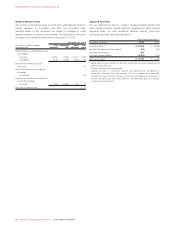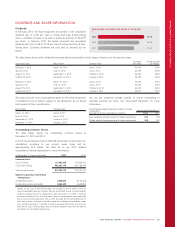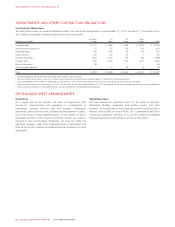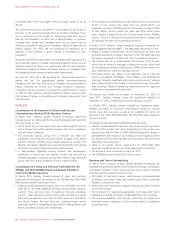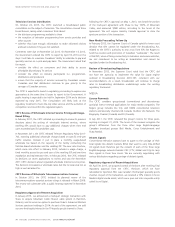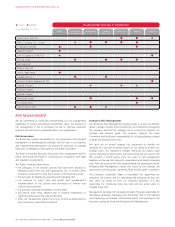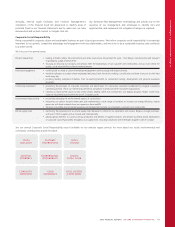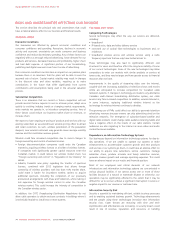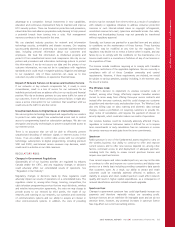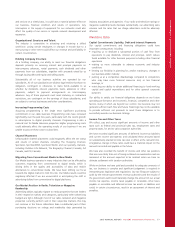Rogers 2013 Annual Report Download - page 71
Download and view the complete annual report
Please find page 71 of the 2013 Rogers annual report below. You can navigate through the pages in the report by either clicking on the pages listed below, or by using the keyword search tool below to find specific information within the annual report.
MANAGEMENT’S DISCUSSION AND ANALYSIS
Regulation in Our Industry
Our business, except for the non-broadcasting operations of Media, is
regulated by two groups:
• the Canadian Federal Department of Industry on behalf of the
Minister of Industry (Canada) (together, Industry Canada)
• the CRTC, under the Telecommunications Act (Canada)
(Telecommunications Act) and the Broadcasting Act (Canada)
(Broadcasting Act).
Regulation relates to the following, among other things:
• wireless spectrum and broadcasting licensing
• competition
• the cable television programming services we must, and can,
distribute
• wireless and wireline interconnection agreements
• rates we can charge third parties for access to our network
• the resale of our networks
• roaming on our networks
• ownership and operation of our communications systems
• our ability to acquire an interest in other communications systems.
Regulatory changes or decisions can adversely affect our consolidated
results of operations.
Our costs of providing services may increase from time to time as we
comply with industry or legislative initiatives to address consumer
protection concerns or Internet-related issues like copyright
infringement, unsolicited commercial e-mail, cybercrime and lawful
access.
Generally, our spectrum and broadcast licences are granted for a
specified term and are subject to conditions for maintaining these
licences. The regulators can modify these licensing conditions at any
time, and they can decide not to renew a licence when it expires. If we
do not comply with the conditions, a licence may be forfeited or
revoked, or we may be fined.
The licences have conditions that require us, amongst other things, to
comply with Canadian ownership restrictions of the applicable
legislation, and we are currently in compliance with them. If we violate
the requirements, we would be subject to various penalties and it could
include losing a licence in extreme cases.
Cable, wireless and broadcasting licences generally cannot be
transferred without regulatory approval.
Canadian Broadcasting Operations
Our Canadian broadcasting operations – including our cable television
systems, radio and television stations, and specialty services – are
licenced (or operated under an exemption order) and regulated by the
CRTC under the Broadcasting Act.
The CRTC is responsible for regulating and supervising all aspects of the
Canadian broadcasting system. It is also responsible under the
Telecommunications Act for the regulation of telecommunications
carriers, including:
• Wireless’ mobile voice and data operations
• Cable’s Internet and telephone services.
Our cable and telecommunications retail services are not subject to
price regulation, because the CRTC believes there is enough
competition for these services provided by other carriers to protect the
interests of users, so has forborne from regulating them. Regulations
can and do, however, affect the terms and conditions under which we
offer these services.
Spectrum Licences
Industry Canada sets technical standards for telecommunications under
the Radiocommunication Act (Canada) (Radiocommunication Act) and
the Telecommunications Act. It licences and oversees:
• the technical aspects of the operation of radio and television stations
• the frequency-related operations of cable television networks
• awarding and supervising spectrum for wireless communications
systems in Canada.
Royalties
The Copyright Board of Canada (Copyright Board) oversees the
administration of copyright royalties in Canada and establishes the
royalties to be paid for the use of certain copyrighted works. It sets the
copyright tariff royalties that Canadian broadcasting undertakings,
including cable, radio, television and specialty services, pay to copyright
collectives.
Billing and Contracts
The Quebec Consumer Protection Act amendments, effective June
2010, introduced new provisions applicable to wireless, wireline and
Internet service contracts. These amendments include new rules on the
content of such contracts, the determination of the early cancellation
fees that can be charged to customers, the use of security deposits and
the cancellation and renewal rights of the consumers. The amendments
also established new provisions on the sale of prepaid cards and the
disclosure of related costs.
Amendments to the Manitoba Consumer Protection Act took effect in
September 2012 and parallel the changes to the Quebec Consumer
Protection Act. Similar legislation also came into effect in September
2012 in Newfoundland and Labrador and has been tabled in Nova
Scotia. A private member’s bill proposing similar legislation has been
introduced in New Brunswick.
In April 2012, the Ontario government announced that it would be
introducing legislation addressing wireless bills and contracts. The
legislation seeks to ensure that contracts are written in plain language
and spell out which services come with the basic fee and which would
result in a higher bill. It requires providers to obtain consent in writing
before they renew or amend a contract. The legislation also seeks a cap
on the cost of cancelling a fixed-term contract that would vary
depending on the circumstances of the contract. The proposed
legislation, which would affect new contracts, would take effect six
months after being passed and would also cover existing agreements
that are amended, renewed or extended after that date. The legislation
was passed into law in October 2013.
See also “CRTC Wireless Code” section under Wireless Regulation.
Foreign Ownership and Control
Non-Canadians can own and control directly or indirectly:
• up to 33.3%of the voting shares and the related votes of a holding
company that has a subsidiary operating company licenced under the
Broadcasting Act, and
•upto20%of the voting shares and the related votes of the
operating licensee company may be owned and controlled directly or
indirectly by non-Canadians.
2013 ANNUAL REPORT ROGERS COMMUNICATIONS INC. 67


